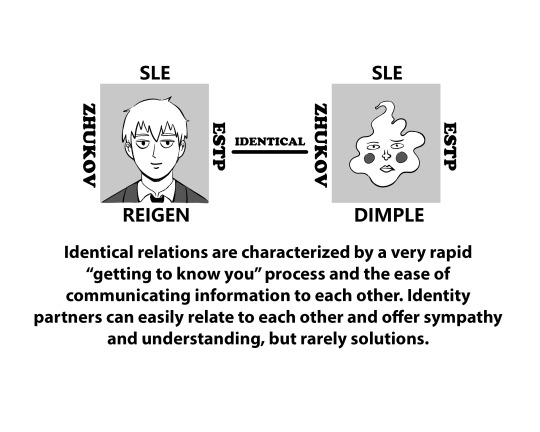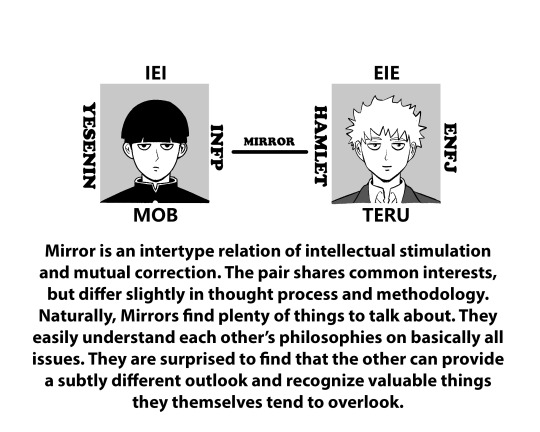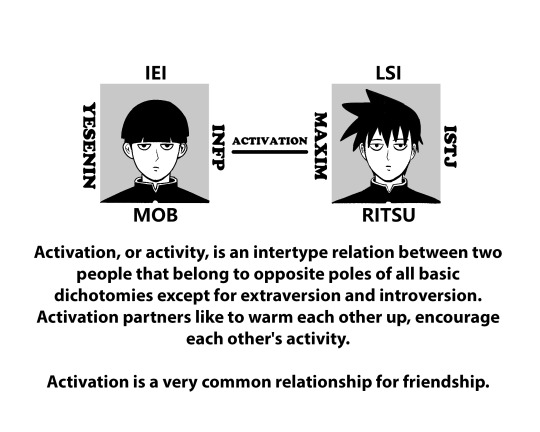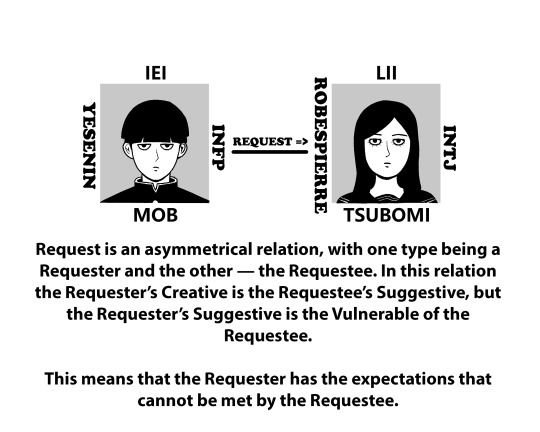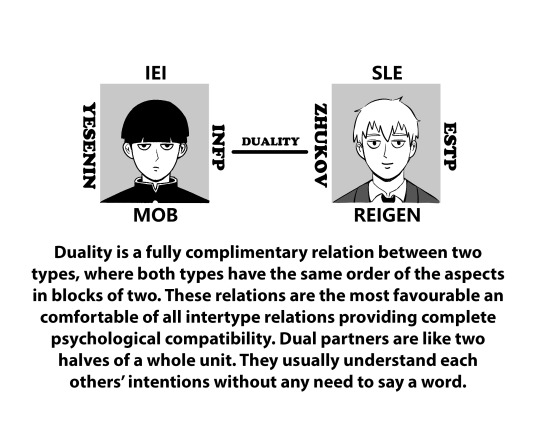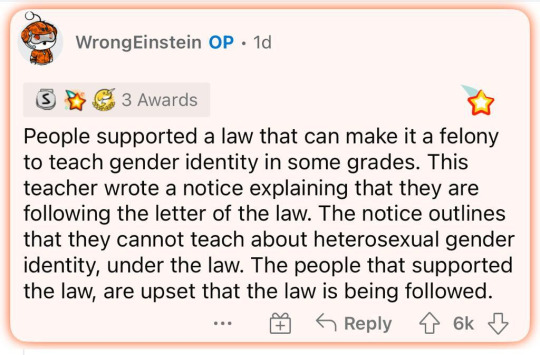Text
I think people, women and girls especially, need to know that if you have a good thing going with another female friend, roomate, a cousin, a siblings, etc–then you don’t have to feel like marriage is like and endgame or something (if that makes sense). Ya know, lemme just make this girl centric.
Let me clarify. I see a lot of girls having happy relationships with their sisters, cousins,best friends, roommates to the point where they’ve been living together for years and are comfortable with it. And becuase of that comfort with the girls they’re living with, a lot of women just end up wanting to live/stay with their roommates, best friends, sisters/cousins, etc., for the foreseeable future.
And when a lot of girls bring this up, they’re met with “well one of you is gonna get married” or “no boy friend in the picture” or “well you can’t stay together forever/you can’t plan your lives around each other” or “what about if one of you gets a husband”
and like–seriously, just stop. when girls mention wanting to spend their lives with their boyfriends and shit, people don’t give them this much flack. girls are expected to pack up their lives to move with their boy friends/husbands.
but god forbid, two girls are just happy with each other, are in a place of comfort with the other that they wanna live together and spend their lives together (either romantic, familial or platonic), then people start to criticize them. So my point is, girls if you’re living with another girl and have been for years and you two are comfortable staying with each other and have basically spoken about just wanting to stay with each other, then do that. if this person makes you comfortable, makes you feel safe and happy, and supports you (whether romantic or not!) then do not let people ruin that bond or shame you for not getting married or being with a man or anything like that. like if you have something good going, then keep the good going.
and this doesn’t have to be romantic (if it is that’s fine too!!).
44K notes
·
View notes
Text
One of the best list of typology sources in my opinion.
^ NOT MINE!
88 notes
·
View notes
Text
socionics intertype relations explained
duality (entp & isfj) : they can help each others’ inferior function since entp ne all the time and isfj si all the time without any forced effort.
activity (entp & esfj) : basically take both extraverts or introverts from a quadra and they activate each other and click quickly. this is because mobilizing function of one type base function of the other. you can mobilize an entp with fe, you can mobilize an entj with se, you can mobilize an infp with si and who can do that better than an fe dom, se dom and si dom respectively?
mirror (entp & intp) : take each thinker or feeler from a quadra and they reflect each other in an upside down way. entp can always look at a ti system and say something like this part can be improved. the same way, anytime entp comes up with a new idea, intp can say something like “that idea could work under such and such system better” so they kind of criticize each other but in a construnctive fashion.
identical (entp & entp) : basically entp says i am the smartest! and other entp says no you suck, i am the smartest! not right away though. in fact, they can vibe extremely well at the beginning but they want to be the greatest at the same areas and that leads to clash.
superego (entp & esfp) : they don’t dislike each other neccessarily but they don’t feel personal attraction either. a wierd respect or neutrality is present here. as an entp myself i respect esfps being gutsy and transparent and emotionally super expressive and stuff and i guess they respect my ultra analytical nature and smarts and stuff the same way. this relations can actually work pretty smoothly because they are not cockblocking each other in any way.
business (entp & estp) : this is like identical relations because estp also wants to be the smartest. se instead of ne though makes things worse. at the beginning, this can also start positively. imagine an estp saying no! we should do it this way! or imagine entp questioning estp’s direct ways of doing things and suggesting a faster and alternative way which makes estp look like a fool. so why this is called business? maybe it’s because you gotta keep that sort of distance for these relations to work.
conflict (entp & isfp) : if you take your 7th and 8th functions in mbti, you would find your conflictor in socionics. for entp, that is fi and se. therefore isfp. these types will approach things from entirely different therefore conflicting ways and immense amount of work cut out for them to understand each other.
contrary (entp & intj) : first of all, i don’t like the name of these relations at all. maybe CRITICAL would be a better name for it because this is like mirror relations but partners criticize each other harder. and that’s sometimes more fun than just boringly getting along with your dual. relations also has this wierd mechanic where entp doesn’t give a damn about fi since fi polr and intj doesn’t give a damn about fe since fe polr. so entp & intj can be best friends indeed. intjs always dig deeper and have more facts and figures in their pockets so that’s kind of an interesting walking encyclopedia sort of thing to entp and entp’s unconventinal ideas and wider and unique synthesizing perspective can be interesting for intj too.
illusionary (entp & infj) : i thought a lot about this and i concluded the name makes sense because these relations “seem like” working great but that’s an illusion, that’s a “mirage”. entp and infj shares fe and ti so that’s where they will get along, they will judge things in the same way. but when it comes to perceiving stuff, this will be just like contrary relations, except partners will criticize each other properly, in the way they can take. infjs can act “like” isfjs and tell entps how x or y is wrong morally. and entps can act “like” estps the same way. you know this must be the case because infjs has si role and entps has se role. role being not real and roleplay-like.
supervision (esfp > infp > entp) : take your 7th (aka polr or blindspot) and 1st functions in mbti and that’s your supervisor in socionics. esfp is SeFi so they supervise infps. infps are FiNe so they supervise entps and entps are NeTi so they would supervise istps. most basically, your supervisor makes you feel like you shouldn’t suck so bad when it comes to your polr. as result you feel like you are supervised. infp makes entp feel more fi aware than any other type. esfp does the same thing to infp when it comes to se. and istps feel like they should talk more with entps. as another result the type that is supervised usually tries to impress their supervisors. “hey look, i have morals and personal values too, see?” entp goes and infp is like “there you go, you can be a decent human being too when you want”.
note: i know there are a few more intertype relations but i will add them later maybe.
75 notes
·
View notes
Text
What’s an INTJ 531 so/sp like in a person?
Withdrawn, secretive, private, but also goal-oriented, wants to make everything perfect (need to be prepared, have all my ducks in a row, and get this right before I ever start in on or share it) in order to avoid any kind of public failure. Torn between wanting to remain on the sidelines and avoid engagement and being 'seen,' so a push-pull between withdrawn energy and aggression in pursuit of desires.
17 notes
·
View notes
Text
cognitive function descriptions directly from the founder of socionics (a. augusta)
White (introverted) intuition (NI)
All processes take place in time; they have their roots in the past and their continuation in the future. Time is the correlation between events that follow each other. This perceptual element provides information about the sequence of events and people's deeds, about their cause and effect relationship, and about participants' attitudes towards this — that is, about people's feelings that these relationships engender.
Such an individual perceives information from without as feelings about the future, past, and present. For example, a sense of hurriedness, calmness, or heatedness, a sense of timeliness or prematureness, a sense of proper or improper life rhythm, a sense of impending danger or safety, anticipation, fear of being late, a sense of seeing the future, anxiety about what lies ahead, and so forth. At any given moment of one's life one has such a sense of time. One cannot live outside of time or be indifferent toward it. Thus, a certain sense of time is an integral part of the individual's psychological state at any given moment. This perceptual element defines a person's ability or inability to forecast and plan for the future, evade all sorts of troubles, avoid taking wrong actions, and learn from past experience.
When this element is in the leading position, the individual possesses innate strategic abilities and is able to choose the most optimal moments for different activities: when to give battle, if necessary, and when to avoid battle, when that would be more appropriate. Interaction in time might be interpreted as the ability to avoid collisions with objects and hence avoid objects' reflection within oneself. [dw's note: great description, 10/10]
Black (extroverted) ethics (FE)
Perceives information about processes taking place in objects — first of all, emotional processes that are taking place in people, their excitation or subduedness, and their moods. This perceptual element implies the ability to know what excites people, and what suppresses them. It defines a person's ability or inability to control his emotional state, and also the emotional states of other people.
When this element is in the leading position, the individual has the innate ability to induce or convey his moods to others and energize people with his emotions. He is able to activate the psychological/spiritual lives of other people and their emotional readiness for action. You might say that such a person has the ability to infect others with his moods and tends to impose on others the emotional states that he considers beneficial for their life activities.
What people usually call emotions or a person's display of emotions is neither more nor less than a form of letting out this internal excitation directly, almost without expending it in muscle activity. A cheerful person who laughs releases an emotional charge and inner excitation through certain movements of the muscles of the face and body. This might be a means for reducing overexcitement, when inner exertion cannot be used for the activity it was intended for. [that would be demonstative fe so exfps] But it can also be a conscious method of conveying one's excitement/agitation to others — inducing one's internal excitement/agitation in the psyches of other people for example, is also a way of reducing overexcitement, but it is usually directed not at arousing others emotionally, but at emotionally suppressing and depleting them, at lowering their activity level, or at strictly channeling their activity. [that would be actual fe dom. very good description 9/10]
White (introverted) ethics (FI)
This is the subjective relationship between two carriers of potential or kinetic energy that shows the level of attraction (or repulsion) between one object or subject and another object or subject. Thanks to this IM element a person feels which objects attract him and which repel him. You might say that this perceptual element conveys information about objects' need or lack of need of each other and about the presence or absence of mutual or one-way needs. [completely unnecessary technical word salad that only gonna confuse people. is it wrong? no. does it help? no.]
Such an individual perceives information about this facet of objective reality the individual perceives as a need for certain objects that satisfy physical wishes/desires, psychological or spiritual desires, and a need for other people [unnecessary technicality continues] — in other words, a person's wishes/desires and interests that are directed toward animate and inanimate objects. This includes feelings of like and dislike, love and hatred, the desire to obtain some thing/object, etc., and greed or the absence of greed. The higher feelings of this kind can be called ethical, because relationships between people's needs are mainly regulated by ethical normals. [ehh...]
When this perceptual element is in the leading position, the individual possesses the innate ability to perceive and evaluate wishes/desires — both his own and others'. [finally something that makes sense.] He always knows who wants what from whom. He is able to set his awareness of subjective reality and his wishes in opposition to those of others. He has the ability to mold and perfect both his own and others' wishes. [i think she means fi understands the feelings of those who don't understand their own feelings and yeah that's what makes fi doms duals of te doms]He possesses both the ability to provide himself with necessary relationships with others and confidence in his capacity to influence other people. His correct perception of human needs allows him to avoid risky collisions when satisfying his own needs. [yes! basically taoist stuff.] This engenders the ability to manipulate people's attachments, and the ability and desire to influence people's ethical feelings and bring these feelings closer to societal ideals. [5/10 thanks to last paragraph]
Black (extroverted) intuition (NE)
Perceives information about objects' potential energy — for example, information about the physical and mental abilities and potential of a person. This perception grants the ability to understand the structure of objects and phenomena and grasp their inner content. This element determines a person's ability or inability to see the real potential energy of one's surroundings.
When this element is in the leading position, the individual has pronounced cognitive interests. This individual is constantly studying underlying phenomena, which he/she is able to communicate to others quite successfully by making complicated things simple. [that would be me right here] Such a person enjoys explaining his understanding of things to others. Under favorable conditions, he/she becomes a scientist or writer. He/she can find optimal ways of increasing the potential energy of objects. [i called this desire to hack instead of working hard a few times before] "Energizes" other people around him with his understanding of the possibilities and potential of the surrounding objects. [pretty good 7.5/10]
Black (extroverted) sensing (SE)
Perceives information about what might be called objects' "kinetic energy" — for example, information about how organized/mobilized a person is, his physical energy and power, and his ability to make use of his willpower or position and exercise his will in opposition to others'. This perception implies the ability to tell what reserves of "kinetic energy" people have and how useful they can be in getting things done. It defines the individual's ability or inability to exercise his willpower and energy in opposition to the will and energy of other people.
When this element is in the leading position, the individual possesses exceptional personal force/will. He is a born organizer of anything. He has the ability to mobilize people to achieve a goal and is able to make use of and manage animate and inanimate objects. Is able to work with things (objects) and reproduce almost any objects based on available samples. This is a reflection of his ability to organize material. These people are known for their striving to materialize their will, energy, and power, and for their desire to impose their will on others. [i didn't like the last paragraph and the overemphasis on the word organizing AT ALL. in reality, it's more about how they can keep trying, keep going, try different things, until one works. so many of their organization attempts will fail at the beginning. the same thing also applies NE. these are experimental functions and based on trial and error. 4/10]
Black (extroverted) logic (TE)
Perceives information about animate and inanimate objects' physical activity, deeds, and actions/activities. This perception provides the ability to make sense of what is going on. It defines the awareness of and ability or inability to think up ways of doing things, distinguish rational actions from irrational ones, and the ability or inability to direct others' work.
When this element is in the leading position, the individual has the ability to plan his and others' work, understand the logicalness and illogicalness of processes, and correct the work activities of other people in accordance with this understanding. And the ability to apply personally and convey to others the most rational ways of doing things. [not impressed but that "distinguish rational from irrational" saved this from being a totally useless definition 4/10]
White (introverted) sensing (SI)
We view an object's internal state as the relationship between events that precondition one another. This element perceives information about how processes are reflected by one's internal state. This includes the sense of one's own condition and the sensations of people evoked by this interdependence. Interaction in space is nothing more than a reflection of one object in another. Objects reflect in other objects, evoking certain sensations in one another. Such an individual perceives external information in form of sensations evoked by ongoing events. For example, the sensation of pain is essentially the reflection within a person's mind of a relationship between his functioning body and a process occurring in some part of the body that impedes this functioning.
When this element of perception is in the leading position, the individual has the ability to change the qualities of the surrounding space and influence the sensations of people within it. He is able to avoid physical discomfort and protect others from it. This element is defined by the ability to recreate previously experienced aesthetic sensations. An excellent example is Peter Paul Rubens, who created his paintings not from nature, but from his memory of once experienced aesthetic sensations. By paintings, he sought to evoke in the viewer certain aesthetic experiences. Such creativity constitutes the recreation of an object that is able to provide other people with aesthetic sensations that were intended by its creator. When an individual of this type is preparing something, he starts from envisioning all the associated qualities that the final product will have.
These people are able to distinguish previously experienced aesthetic sensations from new ones. They are able to "collect" and remember them. This also presupposes that such individuals are able to contra-position their sensations to those of others, the ability to contend for their fulfillment, and the ability to mold and perfect not only one's own aesthetic tastes and habits, but also those of others. We might say that such individuals have the ability to impose their understanding of aesthetics and comfortable life on other people. [one of the worst si definitions ever. sucks even worse than fi one above. wordsalady, unnecessarily technical etc. here's my definition1 and 2]
White (introverted) logic (TI)
We call 'logical' those feelings[!] that arise from the process of comparing one object to another on the basis of some objective criteria — for example, a sense of distance, weight, volume, worth, strength, quality, etc. These are feelings of objective evaluation, which in certain situations help to activate or passivate the person who experiences them. Incoming information is recognized by such an individual as a sense of objects' proper or improper correlation and proportion, a sense of balance or imbalance between the objects, or a sense of understanding or lack of understanding of the advantages of one object over another. This also includes all feelings that result from knowing or not knowing objects and phenomena — curiosity, respect, fear, and a sense of the logicalness or illogicalness of things, as well as a sense of one's own power or powerlessness before different objects. [i was expecting good definition of ti from augusta and i'm getting it.]
All these feelings we shall call logical. Their sum is a person's sense of logic, which is developed to different extents in different people. We might say that logical feelings convey information about presence or lack of knowledge, comparability and incomparability, and the presence or lack of balance between them, as well as about the space and location of object within it. These feelings are called objective because they do not take into consideration the interests and needs of the person him/herself, but only such correlations of objective qualities. This perceptual element determines a person's ability or inability to see the objective, logical relations between objects or their components. [she calls this stuff objective in the sense they are analyzed detachedly, without any ethical bias. for example if component/person x is much more important than component/person y, ti will call it so without minding ethical consequences.]
When this element is in the leading position, the individual is distinguished by his or her ability to logically evaluate relations of the objective static reality, or the world of objects. He also has the ability to change the interrelations between properties of different objects according to his wishes, [and this is where subjectivity begins.] and through this influence objects themselves as carriers of these properties. Correct evaluation of one's relations with other objects helps the individual know which objects should be avoided, and which can be "hunted." Such an individual is able to set his logic — or his knowledge of objectifiable reality, patterns, laws, and correlations of the objective world — in opposition to knowledge of others. He has the ability to mold and perfect not only his own knowledge of objectifiable reality, but also that of other people. This creates a feeling of power when clashing with other people's logic or lack thereof. [good stuff except the overemphasis on the word objective. 7/10]
36 notes
·
View notes
Text
inxj vs inxp difference
if you are talking to yourself a lot (doesn't have to be aloud), if you are acting as if you are this other person and asking yourself questions and answering them, if there's almost always some conversation going on in your mind that would make you a high ne and low si user.
if your brain is much more visual as opposed to verbal, if you know so well in your mind what you feel or think but if translating them into words is a real extra effort for you in real time, that would generally make you an ni dom.
dario nardi's eeg scans actually supports this. infjs and intjs use their visual cortex very heavily. (visual cortex is active when you imagine in pictures, eyes closed too.)
but i really don't need nardi's shit for this and in fact the difference also manifested in reality. infjs and intjs are famous for their hypnotic or mysterious gazes that look directly at you and even "through" you. they are trying to see ni-beyond of the se.
intps are more about what you are precisely saying and if it is logically consistent. this also applies to entps.
infps and enfps on the other hand attend to more "how" you are saying what. what's your intention even if you are logically inconsistent?
naturally then, those who are more about listening would be more verbal and those who watch well and pay attention to actual sensory would be more visual.
darker the brain area in the above diagram, more active that part of the brain is. (zoom in)
68 notes
·
View notes
Text
Enneagram Type Nine Fixes
AUTHORED BY ENTP MOD

9-2: Helps people in order to seek acceptance, promote peace and harmony. Will meet other people’s emotional needs in order to make sure of their own acceptance into the social order. Good mediator.
2-9: Self-erasing, kind, just an all out nice person. Receptive, helpful and caring. There is a sort of distant calmness which tamps down on the active, bustling caring nature of the 2. There can be a tug between the stubborn resistant nature that 9s are prone to show when they are put under pressure versus the 2 need to be compliant in order to people please.
9-3: Ambition is at odds with ambivalence pertaining to what they want. A more extroverted, focused and productive Nine. These Nines may take on projects and use the charisma of Three to fundraise and promote shared universal values of peace and harmony, conflict resolution. A more popularity seeking Nine who wants to be acknowledged publicly for their efforts.
3-9: Tweak themselves to adapt to others, mirroring an idealized self is possible because they seek acceptance. They shy away from conflict, and find it distasteful. A complete departure from self is possible the more they strive towards admiration and approval. Calms down the frenetic, glossy and shiny vibe of the Three.
9-4: Inner turmoil due to intense emotions that they do not allow themselves to express. Establish peace and calm in conflicted situations by honoring the individuality of each party involved. Calm, ambivalent and aesthetic. Weak sense of self. Struggle between self denial and self expression. Can be prone to slothful behavior induced by melancholy moods.
4-9: Withdrawn, compassionate, feeling invisible or insignificant, may feel comfortable in self erasure. Calmer, peace seeking Four. Not as melodramatic or intent on disrupting peace with intense emotional expression. Likely to veer towards Zen kind of art, minimalist designs and muted hues.
9-5: Cerebral and conceptual Nine. Self erasure and total detachment from feelings implies very poor awareness of emotional landscape. Knowledge gathering, peace seeker who strives to stay away from conflict. Nines focused on previous and accuracy. Observe from a distance and make intuitive conclusions that often turn out to be right can end up being too passive, ambivalent and cut-off from the rest of the world if not careful.
5-9: Withdrawn. They are comfortable making themselves invisible as they don’t wish to be overwhelmed with social/emotional commitments and attention. They are highly accommodating.
9-6: Nine focuses on harmony, but also Six is prodding others in low key ways to determine their trustworthiness. Six would emphasize the need for harmony with feeling safe. As much as Nines want to be accepted, Six will lend them an element of caution about who they mirror and seek belonging from. Nine’s calm, passive energy is affected by the heady, nervous energy Six carries. Likely to go into a state of inertia or total shut down because of the fear/ anxiety that fundamentally defines Six. When counterphobic, it may mean that underneath their calm persona, there is a simmering vortex of anger. More likely to be roused into action if the Six is counterphobic.
6-9: Frequent tracker of the people in their lives, because they fear abandonment and betrayal. They strive to be *normal* in order to gain acceptance. They can completely mirror the person or group whose acceptance they seek and want to belong to/with. Unsure and a more phobic Six. Sweet and can be endearing, a razor sharp mind is hidden beneath Nine like layers of humility and a mousy attitude. Kind of like Molly Hooper, from BBC’s Sherlock.
7-9: Lighthearted. Peace seeking and optimistic. Wholesome, there is a playfulness and innocence (depending on the wings) about them. Likely to relegate themselves to a land of idealized fantasy where everything is fine. Deny negative emotions in order to keep the peace. They have a very fluid concept of self identity. Under stress, can be reduced to a state of complete inertia and end up anxious, critical.
9-7: Animated, joyful Nines. They erase all strong emotions except positive emotions. Calm, creative folk. Natural ambivalence and passivity of the Nine is reduced by the Seven which is action oriented by nature. They would like to preserve their autonomy so they can live out their lives in peace. Likely to be homebodies who fantasize about exploring places, might not actually drag their butts out of their house to do so.
Note: When a Nine approach fails, if they move to their counterphobic Six fix, they may act like 9w8/ can end up having their wings or fix mistyped.
179 notes
·
View notes
Text
socionics quadras with some more art and their romance styles

alpha quadra. entp the quadra clown aka don quixote riding his imaginary horse. isfj watching entp like a parent watching his kid with amusement. esfj makes intp feel included. si comfort hits us right away. they are “light-heartedly merry” and non-dramatic.
their romance style described as follows: “Priority is given to keeping the partner happy in the sense of a good mood and amused on a daily basis, with avoidance of direct accusations or unnecessarily harsh criticism; relationships are seen as a source of day-to-day fun and happiness. Focus on remembering dates of particular significance and celebrating them. Playful interactions are based around light teasing and making the partner laugh; intimate atmospheres are based on generating a comfortable, welcoming, cozy atmosphere.”
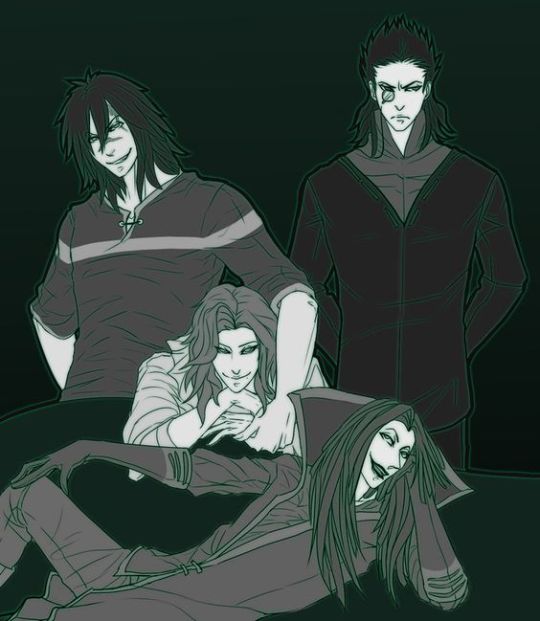
beta quadra. they are also merry but in an se intense way. they are also very dramatic as a result. (stereotype istp stern look in this pic doesn’t make much sense because this would be istp in a new social situation more than within his own quadra). just like esfj makes intp included, enfj would make istp feel included. enfj would give him compliments about how smart, how practical, how productive etc. he is. notice how estp being a good daddy for the infj, holding his/her hand and make them feel (se)cure. enfj aka hamlet, in the most dramatic / theatrical pose of course.
their romance style described as follows: “Beta romantic relationships tend to start from intense exchanges of emotions, either of a playful, aggressive sort, or of a more “tormented” sort based on personal images of special meaning, “romantic” in a 19th-century sense. The two sorts merge together to make Beta the quadra most inclined towards “romantic courtship” in the everyday sense of the term. A relationship is felt to be “lacking” if not accompanied by intense demonstrations of emotions. Romantic relationships are also held together by a sense of common goals and purpose, and of the other person as the best partner towards achieving them. Betas are the most intense of all quadras in terms of exchanges of emotional and sensual interplay.”
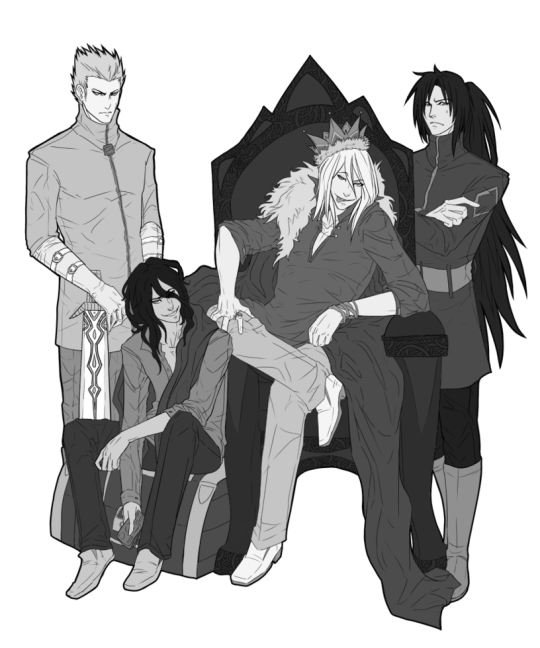
gamma folks with esfp, the self proclaimed joker-king/queen of the quadra in the middle. intj, his/her strategist (from esfp perspective, at least) entj the military hard action guy on most left and isfp who feels like these are his people, his family, and so in a good mood?
their romance style described as follows: “Gammas usually have little time for “romance” in the “wooing” meaning of the term; relationships tend to develop rather as the meeting of two individuals interested in a relationship and each other. Elements of “courtship” or “romance” are seen as rituals with less meaning than the feelings involved. Relationships, also friendships, usually develop from exchanges of information, ideas, personal experiences of special significance, and mutual help, proceeding to activities together.
Gamma romantic interactions tend to focus on the longer-term prospects of the relationship in terms of definition, that is, for instance, even if it is to be a temporary relationship, this should be more or less clear, or at least in one’s mind, from the beginning. General impatience with flirting for flirting’s sake, or for fun; approaches and moves are made with a purpose, which may be altered down the road, nonetheless. Assumption that sexual innuendo and approaches are backed by some sort of emotional attachment. Once a relationship is established as being romantic, interactions tend to focus on physical and somewhat tough interplay and innuendo. Playful power-games, focusing on intensity of interactions and feelings.”
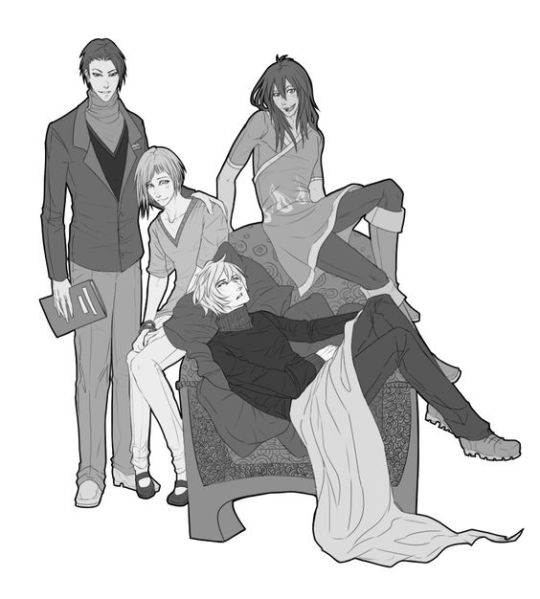
delta quadra. easy to notice how they are also si users. infp, the kiddo of the quadra under the protection of estj daddy. enfp, maybe being funny to put a smile on istj’s face?
their romance style described as follows: “ Delta romantic relationships usually begin simply as the encounter of two individuals interested in a relationship and each other in a particular moment, with very little in terms of outward demonstrations of “romance” in the “wooing” sense of the term or in strong external demonstrations of emotions. Deltas are more focused on the present moment than Gammas, and therefore even relationships of very strong attachment do not lead to constant concerns as to their longer-term practical feasibility. Deltas see as optimal romantic relationships those where partners spend time together on fun activities and sharing ideas of potential practical application. Romantic atmospheres are low-key, based on comfort but practicality.”
21 notes
·
View notes
Photo






a bunch of sanrio dividers!! feel free to use them if you want, but don’t edit or repost them please
15K notes
·
View notes
Text
jung visualized
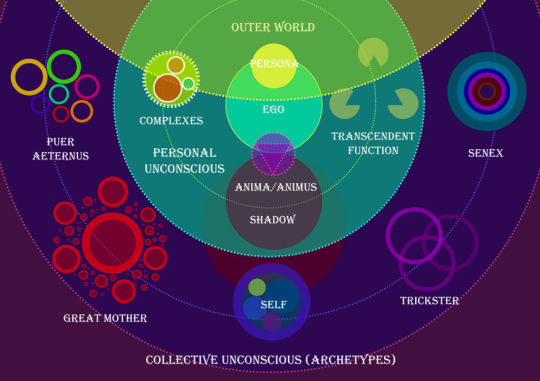
persona: "a kind of mask, designed on the one hand to make a definite impression upon others, and on the other to conceal the true nature of the individual."
ego: organizer of our thoughts and intuitions, feelings, and sensations, and has access to memories which are not repressed. jung thought ego was kind of a complex too.
complex: a partially repressed, yet highly influential cluster of charged psychic material split off from, or at odds with, the conscious "I". this is almost like a secondary ego where we have next to no control unless we know a lot about psychology.
Adonis complex
Cassandra complex
Cinderella complex
Don Juan complex
Electra complex
Father complex
God complex
Hero complex
Icarus complex
Inferiority complex
Jocasta complex
Jonah complex
Laius complex
Madonna–whore complex
Martyr/Victim complex
Medusa complex
Messianic/Messiah complex
Napoleon complex
Oedipus complex
Ophelia complex
Peter pan complex
Phaedra complex
Phaeton complex
Savior complex
Superiority complex
Superman complex
anima/animus: when our ego formed, what has been repressed becomes this. for example ne dominance automatically represses si to inferior slot. originally in jung, former, unconscious masculine side of a woman while the latter unconscious feminine side of a man. 4th slot in beebe, dual-seeking in socionics.
transcendent function: a complex going to be very biased, ego is also going to be biased but with transcendent function we can synthesize conscious and unconscious ideas and images fairly. we can untangle complexes with it. this comes from wisdom and openness and personal development and self acceptance and individuation. you won't find this in mbti or socionics.
self: the center of the total personality, which includes consciousness, the unconscious, and the ego; the Self is both the whole and the center.
puer aeternus : In Jung's conception, the puer typically leads a "provisional life" due to the fear of being caught in a situation from which it might not be possible to escape. He or she covets independence and freedom, opposes boundaries and limits, and tends to find any restriction intolerable. this is how 3rd slot in mbti will behave, unless a ton of work spent towards it through the transcendent function.
trickster: shadow of puer aeternus. pretty much your loki function. why loki is an egoist? why loki acts like he is the best and smartest and invulnerable? because he has daddy issues. thor loved more than him or so he believes, he is not really odin's son anyways: so who the fuck needs odin or thor! not loki! so he acts like he doesn't care, he doesn't need love, he rebels, he acts like a dark puer aeternus. hides the pain and misleads by acting chaotic.
great mother / senex: basically good and bad parent.
diagram from here <- i would highly suggest you to visit this blog. you will find many other and interesting diagrams.
303 notes
·
View notes
Text
If you had to give one piece of advice to each Enneagram type, what would it be?
1: “good enough” really can be good enough. Give yourself a break, go outside and have some fun. Don’t fume while you work, and watch people having fun around you, because you don’t feel like you can let yourself neglect a task to have a good time without guilt.
2: don’t let people take advantage of you just because you feel like you have to help everyone. Learn to say no and not feel bad about it, learn to allow people to do things for you rather than you always insisting that you need to be the one giving it, and don’t expect them to read your mind the way you can read theirs – they can’t.
3: you are worthwhile and worth loving, even if you never achieve anything. I know you can’t believe that, but your self-worth comes from your inner self, not your outer persona or by shaping yourself into who you think other people want you to be. Try to be sincere to yourself, not copy what you think is more appealing. People will still love you.
4: fixing your drama will not make you mundane. You don’t have to build an identity around all the bad things in your life, you don’t have to dwell on them to excess, and you can go along with things, without it threatening your sense of yourself. You don’t have to find fault with everything or look down on it, you can enjoy life and accept it without giving in to the longing for things that don’t exist that will cause you not to live in the moment.
5: you are more capable of doing things than you think, you have more energy resources than you think, and you know enough to do this, rather than sit on the sidelines and fret that one more research volume, one more class, one more book read, one more …. needs to happen before you start. Just… start into it. People will not suck you dry if you let them in, they will enrich your life.
6: you are capable of making your own decisions, and protecting yourself, and doing things on your own, without ruining your life. You weren’t standing behind a door when God handed out wisdom; you are capable of making wise decisions without outside input, and being self-sufficient, if you will just refuse to second-guess yourself and allow yourself to make mistakes. By doing that, you will find out none of them are the end of the world.
7: grow up. And I mean that in the best way. Stop running away from your responsibilities, commitments, from boredom, and avoiding the sad parts of life; learning to live with them will make you a deeper, more well-rounded person who can still make others laugh, but whom others can also count on to be there when things get tough. You have an amazing capacity for humor and joy and an ability to turn things around and see the sunny side of life, so stop flaking out.
8: not everything has to be a fight for dominance. Not every person is looking to take advantage of your weakness. Not every relationship needs to be a power struggle. If you learn to step back and let people in, to give way to them a little bit, you will learn that true power comes from maintaining rather than self-destructing relationships. Let yourself be vulnerable once in awhile and give in to your deeper desire to help others. It doesn’t make you weak, it makes you strong.
9: learn to say no and mean it, without feeling like you have to submit and be invisible to others. You only get one life, so find the courage to decide who you want to be, and what you will tolerate, and stand by it. Stop going along with absolutely everything to avoid others getting upset with you – the upheaval and tantrums you fear from them are minor earthquakes, not tsunamis. The more you learn to draw healthy boundaries, the more joy you will feel in your relationships and the less you will get stuck doing things you hate, just to avoid someone getting annoyed with you. It’s your life. Take it.
342 notes
·
View notes
Text
What are some telltale signs of aux Si/tert Ne vs. aux Ni/tert Se in someone who is already organized and likes to plan but also likes to daydream? I feel like so many people equate planning with Ni but I think Si-Ne plans for the future just as much!!
NiSe is either extremely exact / precise in their vision or just thinks “this is the right thing to do; I will follow this and then the right door will open to me later, this is part of my journey, my first step… it will all become clear in time.” They are guided by future specific glimpses or ideas about themselves.
SiNe is more flexible, changeable, and inclined to self-contradict in their desires for themselves, because they go along with whatever new idea presents itself – I want a capsule wardrobe, but not if it means not buying this amazing jacket that doesn’t match anything in my closet! Their dreams are flexible, shifting as they get new impulses and ideas. They also see how mundane things could become other objects in a very unique way to high Si (some glass and paint, this old clock could become a mirror).
35 notes
·
View notes
Text
Connaissance #3: Existence Is Bittersweet
Here’s the common story plot diagram.

Now, let’s imagine this as your life’s structure. You are sure of what your exposition is and you could maybe imagine it to be your youth. Moving onto your rising action and you perhaps imagine it to be puberty. Your climax is your adulthood where life is bustling and at its peak. You are in search of a stable life while simultaneously battling life’s hardships. You are living life.
However, from that point onwards is where things start to get a bit blurry. What would a falling action be to you? And finally, what does a resolution look like to you?
It’s up to you to decide what you want your life’s “resolution” to be like. Albeit obscure in the long run, you are however completely in charge of how you want to write your story.
Take the ambiguity as you wish, as one could never be sure of a concrete resolution after the falling action and that is, personally, what scares me the most.
4 notes
·
View notes
Text
Enneagram: Upbringing
In childhood, they lacked a sense of…
Presence (1, 8, 9)
embodiment, self, autonomy, willpower
Identity (2, 3, 4)
worth, desirability, self-image, esteem
Stability (5, 6, 7)
confidence, predictability, trust, resourcefulness
They had issues related to their need for…
Protection (1, 2, 6)
father/fatherly figures, clarity, power, authority
Nourishment (3, 7, 8)
mother/motherly figures, growth, nurture, support
Belonging (4, 5, 9)
family/friends, communication, inclusion, culture
In relationship to these experiences, they felt…
Disconnected (1, 4, 7)
interference, dissatisfied, empty, frustration
Ambivalent (2, 5, 8)
reluctance, abnegation, denial, rejection
Connected (3, 6, 9)
dependence, subordinate, reliant, attachment
In order to handle this conflict, they learned to…
Detach (1, 3, 5)
separate, rationalize, objectify, structure
Reframe (2, 7, 9)
avoid, distract, enrich, minimize
Express (4, 6, 8)
react, vent, embrace, release
711 notes
·
View notes
Text
about me: abelle <3
♡ infj || 952 (9w8, 5w6, 2w3) || so/sx || lvfe || LIE || phlegmatic & a wannabe Se user whether that be in socionics or mbti (socionics is a far more comprehensive typing system but far more interesting imo)
♡ dream is to study cognitive science/neuroscience at harvard
♡ she/fae,grayro,sapphic/homoflexible,from the dutch east indies…
2 notes
·
View notes
